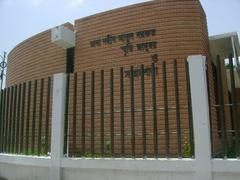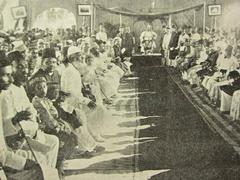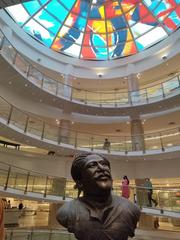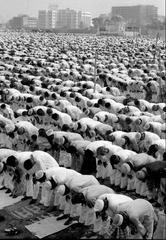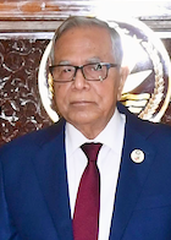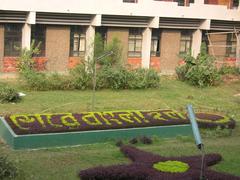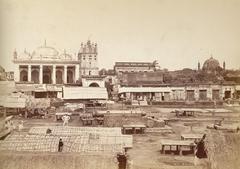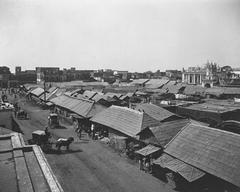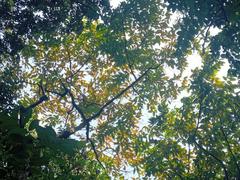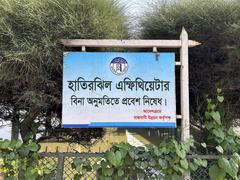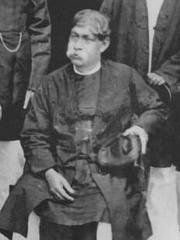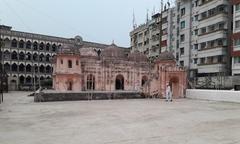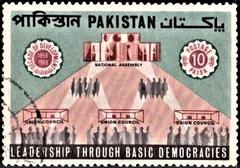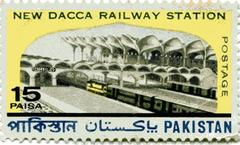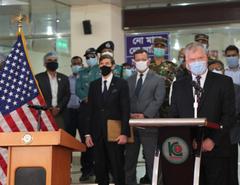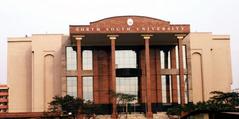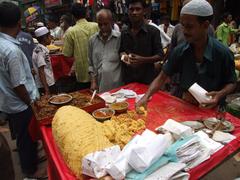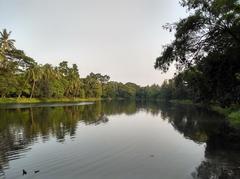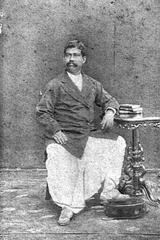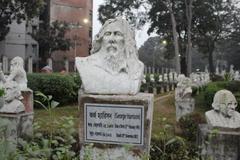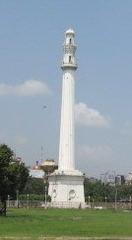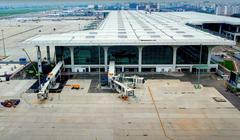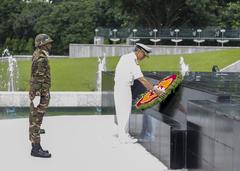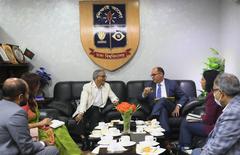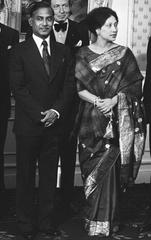Complete Guide to Visiting Dhaka, Bangladesh: Visiting Hours, Tickets, and Historical Sites
Date: 14/06/2025
Introduction: Discover Dhaka’s Historical and Cultural Richness
Dhaka, the capital of Bangladesh, is a living chronicle of South Asia’s layered history and vibrant present. From its roots in ancient settlements along the riverbanks to its rise as a Mughal stronghold and its current status as a bustling megacity, Dhaka seamlessly blends the old with the new. The city’s architectural gems—Lalbagh Fort, Ahsan Manzil, and the Star Mosque—tell stories of Mughal grandeur, colonial transitions, and the resilient spirit of independence. Dhaka’s distinctive fabric is woven with diverse religious traditions, lively festivals, an enduring literary legacy, and a world-renowned culinary scene. As the economic engine of Bangladesh, Dhaka also embraces modern innovation amidst its challenges. This guide provides essential information on Dhaka’s historical landmarks, visiting logistics, and practical travel tips, ensuring a memorable and insightful journey through the heart of Bangladesh. For more in-depth travel advice, explore Facts.net, WeWillNomad, and LaureWanders.
Table of Contents
- Introduction
- Historical Overview
- Key Historical Sites: Visiting Hours, Tickets, and Travel Tips
- Cultural Significance
- Economic Significance
- Cultural and Religious Experiences
- Bustling Markets and Modern Attractions
- Practical Travel Tips
- Frequently Asked Questions (FAQs)
- Conclusion
- References
Historical Overview
Ancient and Early Medieval Foundations
Archaeological findings suggest that present-day Dhaka has been inhabited since at least 500 BCE. Early Bengal kingdoms such as Vanga and Gangaridai established settlements here, leveraging the site’s strategic position along vital river trade routes. Over centuries, the region flourished under the Gupta, Pala, and Sena dynasties. The first written mention of “Daca” appears in 16th-century Portuguese chronicles.
Sultanate and Mughal Ascendancy
Dhaka’s prominence grew under the Delhi Sultanate and later the Mughal Empire, becoming the capital of Mughal Bengal in 1608. The city earned the moniker “Venice of the East” for its vibrant river port and thriving muslin trade. Iconic structures like Lalbagh Fort, built in the late 17th century, are enduring legacies of Mughal architecture and urban planning.
Colonial Era: British Rule and Urban Transformation
With the advent of British colonial rule, Dhaka—then “Dacca”—underwent significant modernization. Infrastructure like embankments, railways, and printing presses emerged. While the city was overshadowed by Kolkata, it retained its unique blend of Mughal and colonial influences.
Twentieth Century: Partition, Growth, and Independence
The 1947 Partition made Dhaka the capital of East Bengal (later East Pakistan), ushering in rapid urban growth. Dhaka became central in the struggle for Bangladesh’s independence, commemorated at the Liberation War Museum, and was declared the capital of the new nation in 1971.
Contemporary Dhaka: Megacity and Modernization
Now home to over 22 million people, Dhaka is divided administratively into North and South City Corporations. The skyline is a mosaic of colonial relics, Mughal monuments, and modern high-rises. Projects like the Dhaka Metro Rail signal ongoing urban transformation.
Key Historical Sites: Visiting Hours, Tickets, and Travel Tips
Lalbagh Fort
- About: An incomplete 17th-century Mughal fort, featuring gardens, mosque, and the tomb of Pari Bibi.
- Hours: 9:00 AM – 5:00 PM daily
- Tickets: 20 BDT (locals); 200 BDT (foreigners)
- Accessibility: Moderate; uneven paths
- Tips: Visit early to avoid crowds. Guided tours available. Photography permitted.
Ahsan Manzil (Pink Palace)
- About: The former Nawab residence, now a museum showcasing aristocratic life and artifacts.
- Hours: 10:00 AM – 6:00 PM; closed Fridays
- Tickets: 30 BDT (locals); 300 BDT (foreigners)
- Accessibility: Mostly accessible, ramps at entrances
- Tips: Combine with other Old Dhaka sites
Dhakeshwari Temple
- About: The national Hindu temple, believed to date to the 12th century.
- Hours: 6:00 AM – 8:00 PM
- Tickets: Free
- Accessibility: Some steps; assistance may be required
Star Mosque (Tara Masjid)
- About: 18th-century mosque famed for its star-patterned mosaic tiles.
- Hours: 8:00 AM – 6:00 PM
- Tickets: Free
- Accessibility: Limited; narrow entrances
Sadarghat River Port
- About: Dhaka’s bustling riverine hub, essential for trade and daily commuting.
- Hours: Open 24 hours
- Tickets: No entry fee; boat fares vary
- Tips: Best visited during the day; river cruises available
Cultural Significance
Religious Diversity and Festivals
Dhaka hosts a vibrant mix of religious communities—primarily Muslim, with Hindu, Christian, and Buddhist minorities (WeWillNomad). Festivals like Eid, Durga Puja, and Pohela Boishakh are celebrated citywide, reinforcing social bonds and offering visitors immersive cultural experiences (Facts.net).
Language, Arts, and Literature
Bengali is the primary language, and the city has a remarkable literary and artistic legacy. Landmarks such as the Bangladesh National Museum and Shilpakala Academy highlight the city’s contributions to art, music, and intellectual life.
Culinary Heritage
Dhaka’s food culture is diverse, featuring street delicacies like biryani, haleem, kebabs, and sweets including pitha and mishti doi (Facts.net). Mughlai and Nawabi influences enrich the city’s culinary offerings (WeWillNomad).
Handicrafts and Social Life
Dhaka’s legacy of muslin weaving and jamdani sarees continues in local markets. Rickshaw art and nakshi kantha (embroidered quilts) are distinctive cultural exports (OhFact). Local hospitality and vibrant street life make every visit memorable.
Economic Significance
Dhaka is Bangladesh’s financial and industrial epicenter, driving growth through the garment sector, banking, and emerging tech industries (HollyMelody). The city is investing heavily in infrastructure, with projects like the metro rail aimed at alleviating congestion (ADB). Dhaka’s role as a commercial gateway is pivotal for national development (Bangladesh Gurukul).
Cultural and Religious Experiences
- Shakhari Bazar: Explore Dhaka’s Hindu heritage in this vibrant street known for temples and conch shell artisans.
- Khan Mohammad Mridha Mosque: An exquisite Mughal mosque still active today.
- Liberation War Museum: Gain insights into Bangladesh’s independence struggle (10:00 AM – 6:00 PM, ~40 BDT).
Bustling Markets and Modern Attractions
- Puran Dhaka Street Food Tour: Savor authentic local flavors on guided culinary walks.
- Bashundhara City Mall: Shop and enjoy entertainment in South Asia’s largest shopping complex.
- Hatirjheel Lakefront: Relax at this urban park with scenic walks and boat rides.
Practical Travel Tips
- Best Time to Visit: November–March for cooler, drier weather.
- Getting Around: Use rickshaws, CNGs, ride-sharing apps, or the metro rail. Expect heavy traffic.
- Dress Code: Modest attire, especially at religious sites.
- Safety: Dhaka is generally safe; keep valuables secure and stay hydrated.
- Costs: Budget-friendly city; meals and accommodations are affordable.
Frequently Asked Questions (FAQs)
Q: What are Lalbagh Fort’s visiting hours?
A: 9:00 AM – 5:00 PM daily.
Q: How do I buy tickets for Ahsan Manzil?
A: At the entrance or through authorized tour operators.
Q: Are guided tours available?
A: Yes, at major sites including Lalbagh Fort and Ahsan Manzil.
Q: Is street food safe?
A: Choose busy stalls with high turnover for better safety.
Q: Which transport is most reliable in Dhaka?
A: Rickshaws and ride-sharing apps are recommended for short to medium distances.
Conclusion
Dhaka’s compelling blend of ancient heritage, architectural marvels, and dynamic city life ensures a rewarding travel experience. From the grandeur of Lalbagh Fort to the vibrant energy of Sadarghat, each site offers a unique window into Bangladesh’s enduring culture and resilient spirit. With practical tips on visiting hours, tickets, and transport, you’re well-equipped to explore the city’s historical and cultural treasures. Download the Audiala app for up-to-date information and make the most of your Dhaka adventure.
References
- Facts.net
- WeWillNomad
- LaureWanders
- OhFact
- HollyMelody
- ADB
- Bangladesh Gurukul
- Travel.gc.ca
- Land of Size
